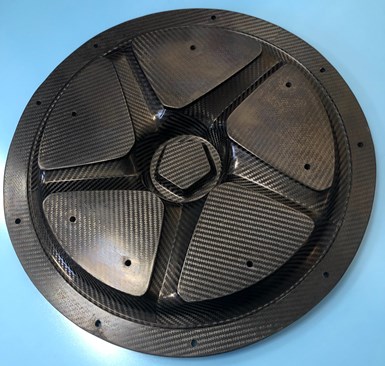PRF Composite Materials launches Q.tool prepreg tooling system
Newly developed Q.tool combines RP800 epoxy with 1,020 g/m2 bulk plies for increased layup speed, reduced number of debulks and better surface finish.

Tool constructed by Supernatural-x using PRF's Q.tool tooling prepreg system. Photo Credit: PRF Composites
PRF Composite Materials (Poole, Dorset, U.K.) is launching its new prepreg tooling system, Q.tool. Designed, developed and manufactured by PRF, Q.tool is reported to significantly reduces the time and costs of tool manufacture, while also providing an improved surface finish, all with sustainability in mind.
Using the company’s RP800 epoxy tooling system, the combination of Q.tool’s new surface and 1,020 g/m2 bulk plies replaces the 1:8:1 system in both weight and thickness, and reduces the number of debulks to as few as one. The increased speed in layup and reduced number of debulks provides an estimated cost/labor saving of up to 50%, PRF says. Q.tool also is said to decrease the amount of plastic consumables used.
According to Kevin Emmett, technical and operations director at Supernatural-x (Bognor Regis, U.K.), using PRF’s Q.tool system took half the time to produce the company’s tools, requiring only one debulk stage. It also exhibited exceptional drapeability around complex mold shapes, Emmett says.
The PRF team will be displaying tools manufactured using Q.tool at JEC World 2022 (booth E41) and will be available for more information on the tooling system.
Related Content
-
The potential for thermoplastic composite nacelles
Collins Aerospace draws on global team, decades of experience to demonstrate large, curved AFP and welded structures for the next generation of aircraft.
-
Plant tour: Teijin Carbon America Inc., Greenwood, S.C., U.S.
In 2018, Teijin broke ground on a facility that is reportedly the largest capacity carbon fiber line currently in existence. The line has been fully functional for nearly two years and has plenty of room for expansion.
-
Plant tour: Joby Aviation, Marina, Calif., U.S.
As the advanced air mobility market begins to take shape, market leader Joby Aviation works to industrialize composites manufacturing for its first-generation, composites-intensive, all-electric air taxi.












